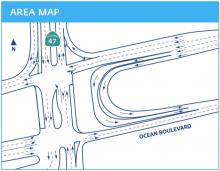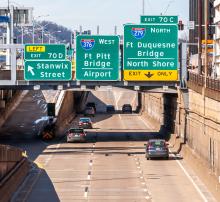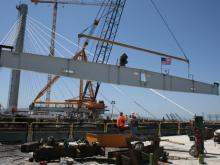A new $4.2 billion funding allocation was announced this week, and the allocations will support the planning and pre-launch efforts of 44 new projects. This financial support comes from two major federal programs that provide MEGA and INFRA grants for infrastructure projects. The 44 projects that were selected primarily focus on bridge construction efforts, rail initiatives, roadway upgrades and the expansions of ports. Funding from both the MEGA and INFRA programs was made available because of the Bipartisan Infrastructure Law, which was passed by Congress in 2021.
Oregon’s International Port of Coos Bay received a $25 million grant to support the planning of a new intermodal port. The funding will support an environmental review and other efforts, including permitting, preliminary engineering and design. When the project is ready to launch, the object will be to deliver a new railyard, container yard, wharf and additional berths at the port. When completed, the intermodal terminal will be the first fully ship-to-rail port facility on America’s West Coast. A projected cost for the entire effort has been placed at $2.3 billion, and construction is planned for 2027.
New York City received $163.8 million to support a modernisation initiative at the Brooklyn Marine Terminal. The project will include rebuilding some piers and replacing others. It will also include expansion work designed to enhance all traffic in and out of the campus where the terminal is located. The project, when completed, will allow the port to service larger ships and allow cargo bound for Brooklyn and Long Island to be delivered directly by ship. It will provide new freight handling options and transform the terminal into a mixed-use hub. An environmental review will begin in 2025 to prepare for permitting, design and construction.
The Maricopa Association of Governments in Phoenix was awarded $146.6 million that will be used to prepare for construction of an intersection that will deliver upgrades and safer pathways around a six-legged highway intersection and two railroad crossings. The work will include construction of an elevated intersection and new bridges above railroad crossings. Other project components will include expanding sidewalks, installing bus pull-outs, constructing bus shelters and enhancing accommodations for future high-capacity transportation. Solicitation documents to contractors will be published in 2026.
The Massachusetts Bay Transportation Authority received $472.3 million to support the replacement of a rail project. This work will require a new rail drawbridge and control tower, extension of a platform, construction of three vertical lift bridges, and replacement and upgrading track, signals and switches throughout the project area in Boston. The project will incorporate resilient design to prevent flooding and mitigate the risk of sea-level rise in construction of the bridge. Design work has started, and construction is scheduled for 2028.
Florida’s Department of Transportation received $66.5 million to support an initiative that will replace the Long Key Bridge in Monroe County. The current bridge is nearing the end of its useful life, and a new, modernized and wider bridge is needed. The new structure will be designed with 3m shoulders, a bicycle/pedestrian shared-use path and strong resilience to severe tropical storms. Materials resistant to salt-water damage will be used. The project is currently in the project development and environment study phase, which will likely last through 2025. Construction is scheduled for early 2027.
The Department of Transportation in Hawaii received $33 million to prepare for a rehabilitation project focused on the Wailuku River Bridge, which is more than 70 years old and in poor condition. The bridge is part of a key freight route connecting the island’s largest port with rural areas. The project will replace the bridge’s superstructure, remove two existing foundation piers, reconstruct the remaining two piers and reinforce the substructure. The bridge will be widened to meet ADA compliancy for accessibility, and bridge railings will be upgraded to meet current safety standards. A total projected cost has been estimated at $55 million. Solicitations for construction services will be published in 2026, and construction work is scheduled for 2027.
A $105 million award was made to the state of California for a project to rework a large highway interchange located in Redwood City. The project’s design work will outline plans to replace all ramps, widen an existing road to six lanes, increase vertical clearance at the intersection and eliminate a five-leg intersection. Additional work will include adding signals to ramp intersections, constructing turn lanes and the construction of flyover ramps with sidewalks and bicycle paths. The overall objective is to reduce significant freight backups that frequently plague the intersection. Although the design work has started, right-of-way acquisition, permitting and other required efforts will continue through 2026. Construction is scheduled for early 2027.
A large allocation of $291 million was awarded to the Illinois Department of Transportation to be used in a project that will modernise and upgrade a 5km elevated rail corridor in Chicago. The work will reconfigure track segments and signals, add a third track, replace and restore 14 aging bridge and viaduct structures, and implement mobility improvements on surface streets throughout the corridor. It will also include signal timing and community improvements such as ADA ramps, lighting and sidewalk/pedestrian enhancements. The design will add resiliency components to mitigate damage caused by flash flooding events. When completed, the project will reduce maintenance costs and delays as there will be separate areas created for passenger and freight movements. Design work should be finalized by Q3 of 2025, and construction will begin in early 2026.
People in Monroe County, Michigan, will soon benefit from a $196 million award to support the replacements of structurally deficient bridges. The River Raisin Bridge, a structural component of Interstate75, will be replaced, and six other structures will be upgraded. One interchange will be reconfigured, and another one will be eliminated. Multiple culverts and ramps will be reworked. New pedestrian and biking features on the River Raisin Heritage Trail will be enhanced, and the new bridge will be designed for a 100-year service life with improved drainage systems to avoid draining stormwater into the river. Construction will likely begin in early 2028.
With each of the projects, engineering, professional services, technology, landscaping and an abundance of equipment and materials will be required. As planning is completed, many additional details will be available for each project.
About the Author: As President and CEO of Strategic Partnerships, Inc. Mary Scott Nabers, a former statewide office holder in Texas, has decades of experience in the public and private sectors. Her unique expertise is her success in connecting the two sectors. Mary is also a well-recognised expert in the P3 world and a true business development professional. Strategic Partnerships, Inc. publishes Government Market News, the premier platform for connecting public and private sector leaders in the government marketplace.









